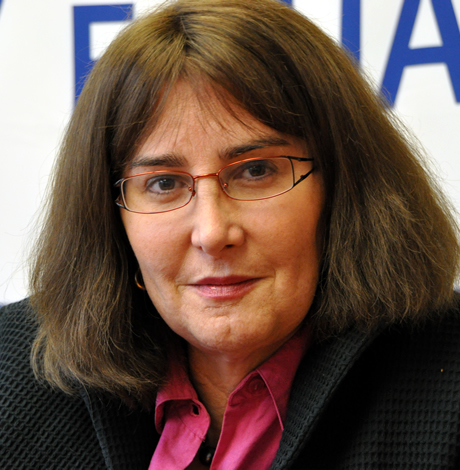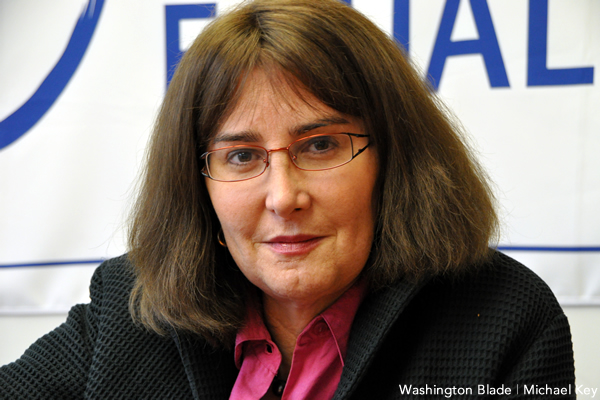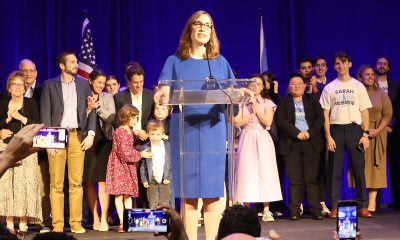National
New survey seeks updated data on trans experience
Are cultural changes impacting people’s lives?


Executive Director of the National Center for Transgender Equality Mara Keisling (Washington Blade photo by Michael Key)
Amid increased transgender visibility and pro-trans policy changes at the federal level, a leading transgender advocacy group is seeking to recreate an influential survey to monitor developments in the trans experience.
Four years ago, the questionnaire — titled “Injustice at Every Turn” and jointly organized by the National Center for Transgender Equality and the National LGBTQ Task Force — was the most extensive survey ever taken of the transgender community and found widespread anti-trans discrimination.
Mara Keisling, executive director of the National Center for Transgender Equality, said her organization is renewing the survey to obtain updated data years later.
“The survey data is used by all activists, almost all journalists, so we wanted everybody to have the most up-to-date data,” Keisling said.
According to NCTE, as of Friday, a total of 12,000 people have committed online to taking the survey — almost double the 6,400 who took the 2011 survey. Keisling said she doesn’t have a goal in mind for the new survey other than an increased number of respondents and outreach to populations such as seniors and people of color. Transgender people can register here to take the survey, which will be online Aug. 19.
“Honestly, we want to see if things are improving,” Keisling said. “It’s been five years. There seems to have been a lot of cultural and policy movement, and we want to see if that’s impacting people’s lives.”
Among the findings of the survey in 2011: Transgender people faced double the rate of unemployment, nine-in-10 say they experienced harassment or discrimination on the job and 19 percent said they were refused housing because of their gender identity.
Many of the questions in the new survey would be the same, but others will be added for more complete data on the trans experience. For example, one question on the 2011 survey found 41 percent of respondents reported attempting suicide and another found one-fifth experienced homelessness at some point in their lives. The updated survey will include follow-up questions on whether these incidents of suicide and homelessness occurred in the past year for more accurate data.
Another new change is redirecting those who complete the survey, which will be anonymous, to a form allowing them share personal stories of anti-trans discrimination. The intent is to add the sense of personal experience for potential use in advocacy work at a later time.
Keisling said the personal story option portion of the survey will add to efforts for advocacy on transgender rights not just on Capitol Hill, but in state capitols and media situations.
“Everybody can opt out of that if they want, but it’s just really important for advocacy to be able to tell real people stories and to be able to find individuals who can come forward and tell their own stories,” Keisling said.
In 2011, the transgender survey was a co-project of NCTE and what is now the National LGBTQ Task Force. This time around, the Task Force has stepped aside to keep the project within NCTE.
Rea Carey, executive director of the Task Force, said in a statement to the Blade her organization is excited about the survey and supporting the launch, but opted to leave it to NCTE.
“Together, the National LGBTQ Task Force and NCTE agreed that NCTE would be the sole producer of the report this year and we look forward to seeing the results,” Carey said. “Like our work together on Injustice at Every Turn, NCTE, the National LGBTQ Task Force, and our movement will be able to use the data to continue to make the case for increased attention to the needs of all transgender people.”
Also contributing to the research team for the survey is Jody Herman, scholar of public policy at the Williams Institute, University of California, Los Angeles. As a consultant to the project, she’s working on survey question design to ensure it’s on par with federal surveys and will help with analysis once data is gathered.
“We’re going to design a public use data set so the data can be made available to other organizations or researchers, academics, so they conduct their own research with the data set, so I’m hoping it’ll fuel another wave of research about transgender people,” Herman said.
One reason for renewing the survey is the lack of information on transgender people in the American population at the federal level. Although the Department of Health & Human Services has included sexual orientation questions in health surveys, questions about gender identity have not been included.
Keisling said most information about groups of people in the United States comes from federal government initiatives, which she called “the gold standard for data,” but she said information is lacking for LGBT people.
“One of the most disappointing things about the federal government currently, and there has been so much progress on LGBT issues in the Obama administration…but still we do not have the federal government data for trans people, or even gay, bi people, or just queer people in general,” Keisling said. “We just don’t have them studying us as they should be yet. We’re going to keep pushing for that, but until then, we’re going to have to be collecting our own data.”
It seems unlikely a transgender-related question will be added to the questionnaire the U.S. Census Bureau distributes every 10 years and anticipated in 2020 because that survey will be reduced to a short form. Instead, transgender advocates are pushing for inclusion in the American Community Survey, the annual survey with more extensive questions.
Keisling said there are dozens of other surveys to which LGBT questions could be added, including many conducted by the Department of Health & Human Services. The best way to look at the issue, Keisling said, is through agencies. Just last week, she said she had a meeting with the Bureau of Justice Statistics within the Justice Department.
“There’s the Bureau of Labor Statistics, there’s the National Center for Health Statistics, there are just so many, and there’s just a very small few now that are beginning to count LGBT people,” Keisling said.
Jamal Brown, a spokesperson for the White House Office of Management & Budget, responded by saying policymakers for years have collected data on LGBT populations, but acknowledged more work remains.
“LGBT people are not uniform, with experiences shaped by a diversity of factors including age, race, gender, socioeconomic background, education, and disability,” the spokesperson said. “And without improved data, there’s no way to adequately describe these differences and what they mean for LGBT Americans.”
But Brown said an interagency review is underway to evaluate federal data gathering for LGBT people and “develop recommendations that will inform federal statistics in the future.” The White House Office of Information and Regulatory Affairs held its first interagency meeting on the issue April 9.
Once the data from the latest transgender survey is obtained, Keisling said she expects it to show where anti-trans discrimination exists and that it will help lead the way to fixing it.
“But we’re also going to disseminate the information to the state LGBT groups, to local HIV service organizations, the federal government probably will use the survey in different ways and the media, which has become such an important public education around trans issues, will be no doubt using the survey,” Keisling said.
Keisling said much like the 2011 questionnaire, she predicts the survey will reveal the problems facing transgender people are compounded when they’re part of racial minority groups because of persistent racism.
For example, the 2011 survey found black transgender people live in a significantly higher rate of poverty. Thirty-four percent reported a household income of less than $10,000 a year. That’s more than twice the rate for transgender people of all races (15 percent), four times the general black population rate (9 percent) and more than eight times the general U.S. population rate (4 percent).
But Keisling said the data from the updated survey will “absolutely” be a tool to help ameliorate those compounded problems going forward.
“When you’re trying to move forward, it’s important to understand where you are and which moves forward are the most urgently needed, and this survey will really help with that,” Keisling said.
Federal Government
HHS to retire 988 crisis lifeline for LGBTQ youth
Trevor Project warns the move will ‘put their lives at risk’

The U.S. Department of Health and Human Services is planning to retire the national 988 crisis lifeline for LGBTQ youth on Oct. 1, according to a preliminary budget document obtained by the Washington Post.
Introduced during the Biden-Harris administration in 2022, the hotline connects callers with counselors who are trained to work with this population, who are four times likelier to attempt suicide than their cisgender or heterosexual counterparts.
“Suicide prevention is about risk, not identity,” said Jaymes Black, CEO of the Trevor Project, which provides emergency crisis support for LGBTQ youth and has contracted with HHS to take calls routed through 988.
“Ending the 988 Suicide and Crisis Lifeline’s LGBTQ+ youth specialized services will not just strip away access from millions of LGBTQ+ kids and teens — it will put their lives at risk,” they said in a statement. “These programs were implemented to address a proven, unprecedented, and ongoing mental health crisis among our nation’s young people with strong bipartisan support in Congress and signed into law by President Trump himself.”
“I want to be clear to all LGBTQ+ young people: This news, while upsetting, is not final,” Black said. “And regardless of federal funding shifts, the Trevor Project remains available 24/7 for anyone who needs us, just as we always have.”
The service for LGBTQ youth has received 1.3 million calls, texts, or chats since its debut, with an average of 2,100 contacts per day in February.
“I worry deeply that we will see more LGBTQ young people reach a crisis state and not have anyone there to help them through that,” said Janson Wu, director of advocacy and government affairs at the Trevor Project. “I worry that LGBTQ young people will reach out to 988 and not receive a compassionate and welcoming voice on the other end — and that will only deepen their crisis.”
Under Trump’s HHS secretary, Robert F. Kennedy, Jr., the agency’s departments and divisions have experienced drastic cuts, with a planned reduction in force of 20,000 full-time employees. The Substance Abuse and Mental Health Services Administration has been sunset and mental health services consolidated into the newly formed Administration for a Healthy America.
The budget document reveals, per Mother Jones, “further sweeping cuts to HHS, including a 40 percent budget cut to the National Institutes of Health; elimination of funding for Head Start, the early childhood education program for low-income families; and a 44 percent funding cut to the Centers for Disease Control, including all the agency’s chronic disease programs.”
U.S. Supreme Court
Supreme Court hears oral arguments in LGBTQ education case
Mahmoud v. Taylor plaintiffs argue for right to opt-out of LGBTQ inclusive lessons

The U.S. Supreme Court on Tuesday heard oral arguments in Mahmoud v. Taylor, a case about whether Montgomery County, Md., public schools violated the First Amendment rights of parents by not providing them an opportunity to opt their children out of reading storybooks that were part of an LGBTQ-inclusive literacy curriculum.
The school district voted in early 2022 to allow books featuring LGBTQ characters in elementary school language arts classes. When the county announced that parents would not be able to excuse their kids from these lessons, they sued on the grounds that their freedom to exercise the teachings of their Muslim, Jewish, and Christian faiths had been infringed.
The lower federal courts declined to compel the district to temporarily provide advance notice and an opportunity to opt-out of the LGBTQ inclusive curricula, and the 4th U.S. Circuit Court of Appeals determined that the parents had not shown that exposure to the storybooks compelled them to violate their religion.
“LGBTQ+ stories matter,” Human Rights Campaign President Kelley Robinson said in a statement Tuesday. “They matter so students can see themselves and their families in the books they read — so they can know they’re not alone. And they matter for all students who need to learn about the world around them and understand that while we may all be different, we all deserve to be valued and loved.”
She added, “All students lose when we limit what they can learn, what they can read, and what their teachers can say. The Supreme Court should reject this attempt to silence our educators and ban our stories.”
GLAD Law, NCLR, Family Equality, and COLAGE submitted a 40-page amicus brief on April 9, which argued the storybooks “fit squarely” within the district’s language arts curriculum, the petitioners challenging the materials incorrectly characterized them as “specialized curriculum,” and that their request for a “mandated notice-and-opt-out requirement” threatens “to sweep far more broadly.”
Lambda Legal, the Leadership Conference on Civil and Human Rights, PFLAG, and the National Women’s Law Center announced their submission of a 31-page amicus brief in a press release on April 11.
“All students benefit from a school climate that promotes acceptance and respect,” said Karen Loewy, senior counsel and director of constitutional law practice at Lambda Legal. “Ensuring that students can see themselves in the curriculum and learn about students who are different is critical for creating a positive school environment. This is particularly crucial for LGBTQ+ students and students with LGBTQ+ family members who already face unique challenges.”
The organizations’ brief cited extensive social science research pointing to the benefits of LGBTQ-inclusive instruction like “age-appropriate storybooks featuring diverse families and identities” benefits all students regardless of their identities.
Also weighing in with amici briefs on behalf of Montgomery County Public Schools were the National Education Association, the ACLU, and the American Psychological Association.
Those writing in support of the parents challenging the district’s policy included the Center for American Liberty, the Manhattan Institute, Parents Defending Education, the Alliance Defending Freedom, the Trump-Vance administration’s U.S. Department of Justice, and a coalition of Republican members of Congress.
U.S. Supreme Court
LGBTQ groups: SCOTUS case threatens coverage of preventative services beyond PrEP
Kennedy v. Braidwood oral arguments heard Monday

Following Monday’s oral arguments before the U.S. Supreme Court in Kennedy v. Braidwood Management, Inc., LGBTQ groups issued statements warning the case could imperil coverage for a broad swath of preventative services and medications beyond PrEP, which is used to reduce the risk of transmitting HIV through sex.
Plaintiffs brought the case to challenge a requirement that insurers and group health plans cover the drug regimen, arguing that the mandate “encourage[s] homosexual behavior, intravenous drug use, and sexual activity outside of marriage between one man and one woman.”
The case has been broadened, however, such that cancer screenings, heart disease medications, medications for infants, and several other preventive care services are in jeopardy, according to a press release that GLAAD, Lambda Legal, PrEP4All, Harvard Law’s Center for Health Law and Policy Innovation (CHLPI), and the Center for HIV Law and Policy (CHLP) released on Monday.
The Trump-Vance administration has argued the independent task force responsible for recommending which preventative services must be covered with no cost-sharing for patients is constitutional because the secretary of the U.S. Department of Health and Human Services can exercise veto power and fire members of the volunteer panel of national experts in disease prevention and evidence-based medicine.
While HHS secretaries have not exercised these powers since the Affordable Care Act was passed in 2010, Braidwood could mean Trump’s health secretary, Robert F. Kennedy Jr., takes a leading role in determining which services are included in the coverage mandate.
Roll Call notes the Supreme Court case comes as the administration has suspended grants to organizations that provide care for and research HIV while the ongoing restructuring of HHS has raised questions about whether the “Ending the HIV Epidemic” begun under Trump’s first term will be continued.
“Today’s Supreme Court hearing in the Braidwood case is a pivotal moment for the health and rights of all Americans,” said GLAAD President Sarah Kate Ellis. “This case, rooted in discriminatory objections to medical necessities like PrEP, can undermine efforts to end the HIV epidemic and also jeopardize access to essential services like cancer screenings and heart disease medications, disproportionately affecting LGBTQ people and communities of color.”
She added, “Religious exemptions should not be weaponized to erode healthcare protections and restrict medically necessary, life-saving preventative healthcare for every American.”
Lambda Legal HIV Project Director Jose Abrigo said, “The Braidwood case is about whether science or politics will guide our nation’s public health policy. Allowing ideological or religious objections to override scientific consensus would set a dangerous precedent. Although this case began with an attack on PrEP coverage, a critical HIV prevention tool, it would be a serious mistake to think this only affects LGBTQ people.”
“The real target is one of the pillars of the Affordable Care Act: The preventive services protections,” Abrigo said. “That includes cancer screenings, heart disease prevention, diabetes testing, and more. If the plaintiffs succeed, the consequences will be felt across every community in this country, by anyone who relies on preventive care to stay healthy.”
He continued, “What’s at stake is whether we will uphold the promise of affordable and accessible health care for all or allow a small group of ideologues to dismantle it for everyone. We as a country are only as healthy as our neighbors and an attack on one group’s rights is an attack on all.”
PrEP4All Executive Director Jeremiah Johnson said, “We are hopeful that the justices will maintain ACA protections for PrEP and other preventive services, however, advocates are poised to fight for access no matter the outcome.”
He continued, “Implementing cost-sharing would have an enormous impact on all Americans, including LGBTQ+ individuals. Over 150 million people could suddenly find themselves having to dig deep into already strained household budgets to pay for care that they had previously received for free. Even small amounts of cost sharing lead to drops in access to preventive services.”
“For PrEP, just a $10 increase in the cost of medication doubled PrEP abandonment rates in a 2024 modeling study,” Johnson said. “Loss of PrEP access would be devastating with so much recent progress in reining in new HIV infections in the U.S. This would also be a particularly disappointing time to lose comprehensive coverage for PrEP with a once every six month injectable version set to be approved this summer.”
“Today’s oral arguments in the Braidwood case underscore what is at stake for the health and well-being of millions of Americans,” said CHLPI Clinical Fellow Anu Dairkee. “This case is not just about legal technicalities — it is about whether people across the country will continue to have access to the preventive health services they need, without cost sharing, regardless of who they are or where they come from.”
She continued, “Since the Affordable Care Act’s preventive services provision took effect in 2010, Americans have benefited from a dramatic increase in the use of services that detect disease early, promote healthy living, and reduce long-term health costs. These benefits are rooted in the work of leading scientists and public health experts, including the U.S. Preventive Services Task Force, whose recommendations are based on rigorous, peer-reviewed evidence.”
“Any shift away from cost-free access to preventive care could have wide-ranging implications, potentially limiting access for those who are already navigating economic hardship and health disparities,” Dairkee said. “If Braidwood prevails, the consequences will be felt nationwide. We risk losing access to lifesaving screenings and preventive treatments that have become standard care over the past decade.”
“This case should serve as a wake-up call: Science, not politics, must guide our health care system,” she said. “The health of our nation depends on it.”
“We are grateful for the Justices who steadfastly centered constitutionality and didn’t allow a deadly political agenda to deter them from their job at hand,” said CHLP Staff Attorney Kae Greenberg. “While we won’t know the final decision until June, what we do know now is not having access to a full range of preventative healthcare is deadly for all of us, especially those who live at the intersections of racial, gender and economic injustice.”
“We are crystal clear how the efforts to undermine the ACA, of which this is a very clear attempt, fit part and parcel into an overall agenda to rollback so much of the ways our communities access dignity and justice,” he said. “Although the plaintiffs’ arguments today were cloaked in esoteric legal language, at it’s heart, this case revolves around the Christian Right’s objection to ‘supporting’ those who they do not agree with, and is simply going to result in people dying who would otherwise have lived long lives.”
“This is why CHLP is invested and continues in advocacy with our partners, many of whom are included here,” Greenberg said.
-

 Federal Government3 days ago
Federal Government3 days agoHHS to retire 988 crisis lifeline for LGBTQ youth
-

 Opinions3 days ago
Opinions3 days agoDavid Hogg’s arrogant, self-indulgent stunt
-

 District of Columbia3 days ago
District of Columbia3 days agoD.C. police seek help in identifying suspect in anti-gay threats case
-

 Virginia3 days ago
Virginia3 days agoGay talk show host wins GOP nom for Va. lieutenant guv











